Introduction to Artificial Intelligence in Business
The integration of Artificial Intelligence (AI) in business involves the utilization of AI-powered tools, such as machine learning algorithms, natural language processing (NLP) and computer vision to enhance business operations, and improve employee productivity. As technology continues to grow, AI is rapidly becoming a valuable asset for various companies.
Different industries are expecting that AI will have a significant impact in different areas within the organization. Various sectors, such as the technology and public sector, will experience crucial impacts from AI, with information technology, customer service, and operations and manufacturing among the most affected industries .
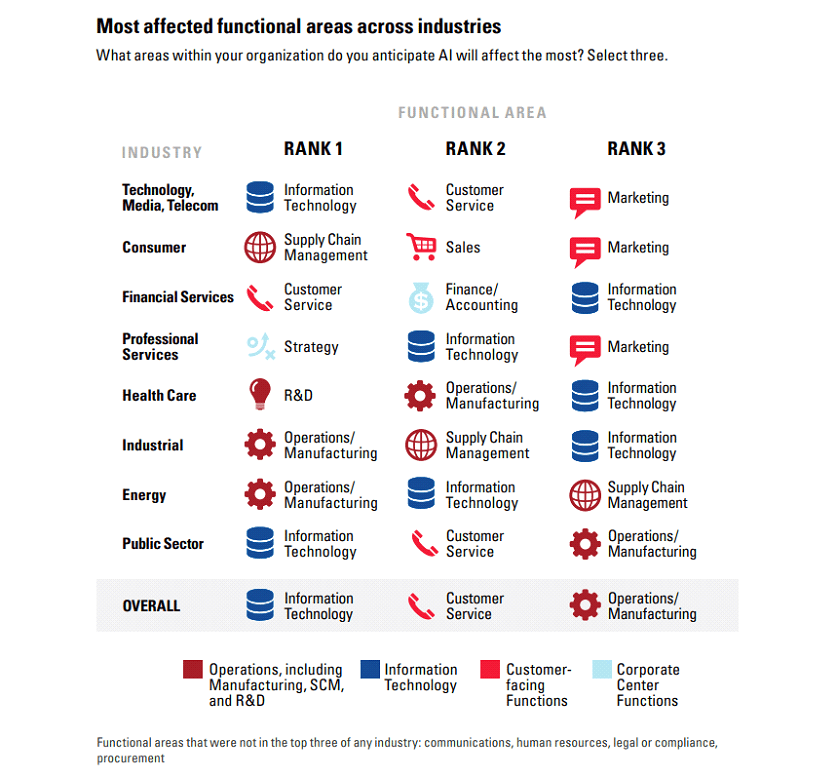
Artificial intelligence is already causing significant organizational changes in the business landscape, reshaping how companies conduct their business operations and addressing implications of AI in the industry. Its application across different functional areas including, decision-making, customer service, automation, business analytics, human resources, marketing, and supply chain management.
AI and Decision Making
AI is transforming the world of decision-making in business. With the capacity for analyzing complex data and identifying trends and patterns, AI is becoming a valuable tool for strategic planning. According to Forbes surveys, 44 % of different businesses recognize the benefits of AI in decision-making processes, strengthening customer relationships, enhancing efficiency, and managing processes more effectively.
For instance, AI enhances the decision-making process within supply chains through data analysis in automated systems. This powered tool equips businesses to make rational decisions and achieve better overall results. As AI technology continues to progress, its significance in the business decision-making process is anticipated to expand, thereby making it a crucial factor in maintaining a competitive edge in the marketplace.
AI in Customer Service
AI has revolutionized the way businesses interact with their customers. By using AI in customer service, companies can offer tailored experiences, guaranteeing that each customer feels heard and valued. Chatbots and virtual assistants, powered by AI, are capable of providing personalized support, handling multiple inquiries simultaneously, and providing quick responses.
Moreover, AI-driven customer services enable businesses to expect customer needs and offer personalized recommendations. This approach in customer service can lead to increased customer relationship and loyalty, as people are more likely to return to a service that understands their preferences and provides customs solutions.
In the competitive world of business, the ability to maintain strong customer relationships is critical, and AI serves as the pivotal key in this aspect. The integration of AI in customer service is not just a trend, but rather a strategic move towards creating a more efficient and customer-centric business approach that can drive long-term positive financial performances and success.
AI in Automation
AI enhances efficiency by automating operations and reducing human errors, resulting in time and cost savings. The integration of AI in business operations allows for the automation of routine tasks, such as customer service through chatbots. This automation extends to various business workflows, enabling employees to focus on more strategic tasks that require human insights, thereby boosting overall productivity.
In the production section, AI-powered robots are known for their precision and consistency, minimizing downtime and maximizing output. These robots are evidence of the capabilities of artificial intelligence in enhancing production processes, reducing errors, and increasing the quality of products. Furthermore, the cost-effectiveness of AI automation allows businesses to allocate their financial resources more strategically and lessen production times.
By utilizing the power of AI, businesses can not only enhance their current operations but also innovate and adapt to future challenges, and ensure long-term success in an advanced digital economy.
AI and Business Analytics
AI has changed the landscape of business analytics by providing tools that can interpret and predict based on data. Machine learning aids in understanding customer behavior and market analysis, enabling businesses to personalize their strategies to meet the demands of their customers and market. This predictive capability extends to risk assessment, where AI systems can analyze large amounts of data to identify potential risk.
The power of AI in analysis is unmatched by traditional methods. It can process and analyze data fasterfor real-time insights, which is critical in a dynamic business environment. Due to the speed and accuracy of AI algorithms, it empowers business owners to benchmark data effectively.
In auditing, AI can analyze audit transactions in real-time is a game changer. It provides a level of detail and precision that manual procedures simply cannot match, leading to more accurate and reliable insights. In supply chain management, AI is making a significant impact. By utilizing predictive analysis, AI can forecast shipping and material costs, allowing businesses to plan more effectively and efficiently manage their resources.
Furthermore, AI algorithms can process data faster and more accurately which helps for determining the ideal operating conditions for different business processes. As AI continues to improve, its role in business analytics is likely to become more significant on how companies approach data and make strategic decisions.
AI in Human Resources
In the field of human resources, AI offers innovative solutions that make the recruitment process efficient and enhance talent acquisition strategies. AI powered tools for talent sourcing are capable of analyzing large amounts of data, interpreting job descriptions, and matching potential qualified candidates. These systems can analyze resumes and profiles to identify candidates who fit the criteria, in order to reduce time unlike traditional approaches.
Moreover, AI-powered chatbots are transforming the initial stage of the recruitment process by conducting preliminary interviews and assessments. This automation allows for a more efficient and convenient screening process that enables human resources to handle large numbers of applicants without bargaining the quality of the selection process. The application of AI in the field of human resource is proof that it has the potential to improve business operations.
AI and Marketing
AI is transforming the business industry, specifically in the field of marketing and sales. Through the utilization of AI, different companies can analyze large amounts of data to predict future finance patterns and can conduct thorough competitor analysis. This approach has the capability to enable businesses to stay ahead of market trends and personalize their strategies.
Furthermore, AI’s role in communication has reached beyond customer interaction. AI has significantly enhanced email marketing, which is a crucial aspect of direct marketing strategies. Through the use of AI in marketing, businesses can tailor marketing campaigns ensuring that each customer receives content that is relevant to their interest. This amount of personalization enhances customer engagement and also cultivates loyalty and trust in the company. In the dynamic world of digital marketing, AI plays an important role for businesses who are looking to innovate their marketing strategies.
AI in Supply Chain Management
AI technologies are quickly evolving, and their use is expanding to meet a variety of businesses needs and strategies. In the field of supply chain management, AI offers tools for enhancing operations management and manufacturing processes. Through the use of predictive analytics, AI can forecast the shipping and material cost with accuracy, thus it helps to mitigate overstocking of products. The integration of AI in supply chain management can be categorized into four distinct attributes: prediction, optimization, modeling and simulation, and decision support.
The implementation of artificial intelligence in supply chain management is not just an upgrade but it’s a strategic business move. The adoption of AI can increase visibility and transparency throughout the supply chain, which is crucial for identifying problems and opportunities for improvement. Additionally, it can also improve the company’s product and service offerings leading to increase of customer satisfaction.
As the advancement of AI continues, it is expected that the field of supply chain management will likely expand, leading to a significant transformation in the business operations. AI offers businesses the flexibility to navigate the complications of modern supply chain management.
Integration of Artificial Intelligence for Business Transformation
In “The AI Advantage: How to Put the Artificial Intelligence Revolution to Work” ,Thomas H. Davenport discusses the transformative impact of artificial intelligence on businesses. It is revealed that companies with a higher number of AI projects tend to achieve more significant benefits. This correlation emphasizes the essence of Artificial intelligence in enhancing operational efficiency and innovation.
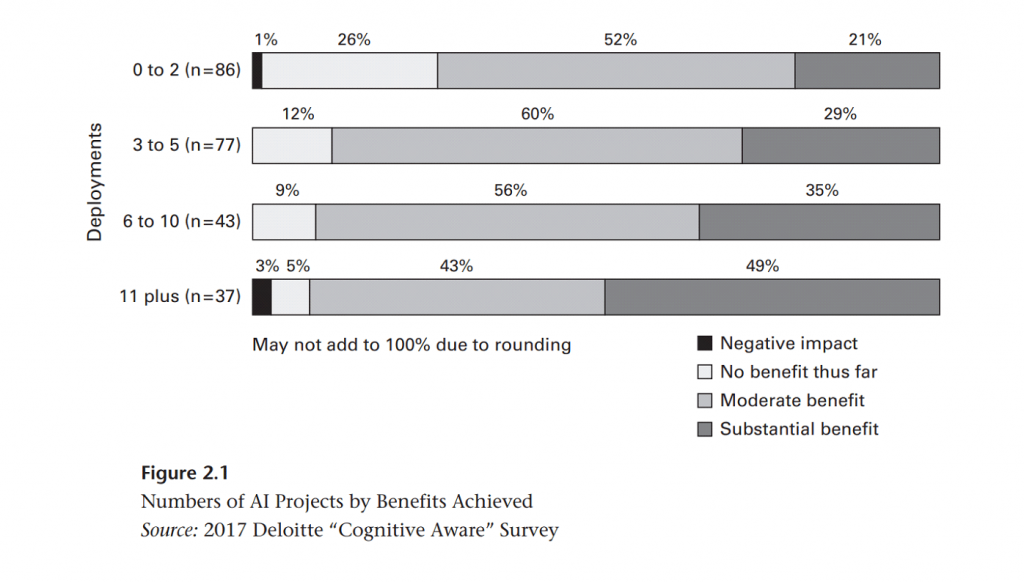
Additionally, companies are showing a high commitment to using AI in customer-facing and revenue-generating activities, such as sales. This trend points out that businesses acknowledge the possibility of AI to strengthen customer engagement and drive sales growth.
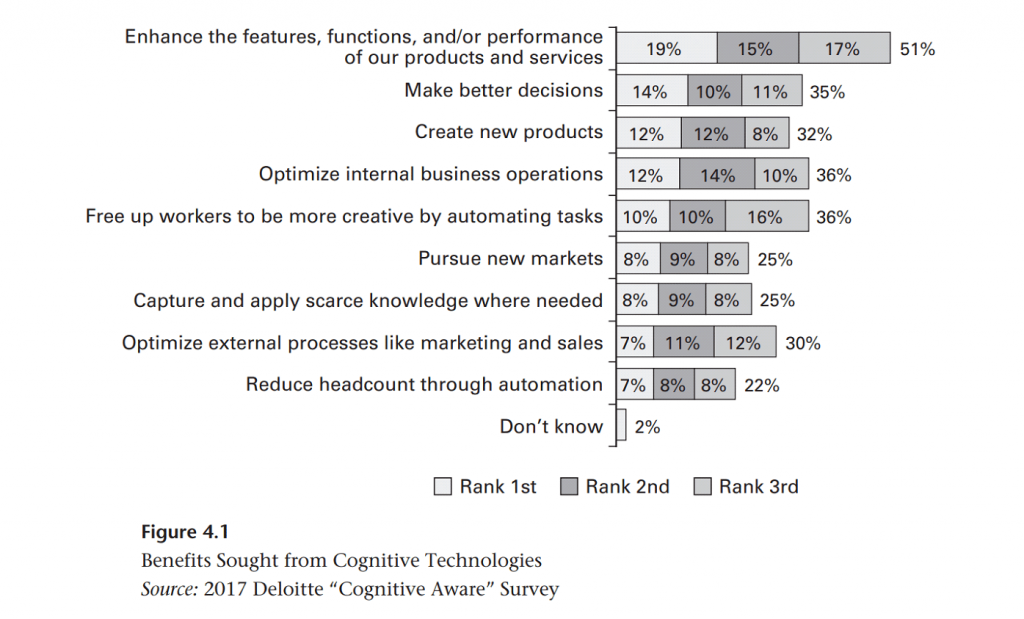
In addition, Davenport discusses the transformative impact of cognitive technologies on business. He emphasizes their significance as a tool for positive change, highlighting their importance to the enhancement of products, services, and internal business processes. Regardless of being in the developing stages of adoption, companies have already experienced moderate to substantial benefits from cognitive technologies. The studies reveal a strong preference among businesses to leverage cognitive technologies not only to build up their current offerings but also to innovate and delve into new markets. This case study reflects a wider trend of integrating artificial intelligence to gain an edge and drive growth in the business world.
In the book “All-in On AI: How Smart Companies Win Big with Artificial Intelligence” by Thomas H. Davenport and Nitin Mittal serve as guides for businesses on transforming their own businesses with the help of artificial intelligence. With detailed case studies and practical insights from different companies, it demonstrates the progressive power of AI when it is applied systematically across business operations and processes. It also underscores that AI powered companies that integrate AI are not just about technologies; but they are propelled by human leadership.
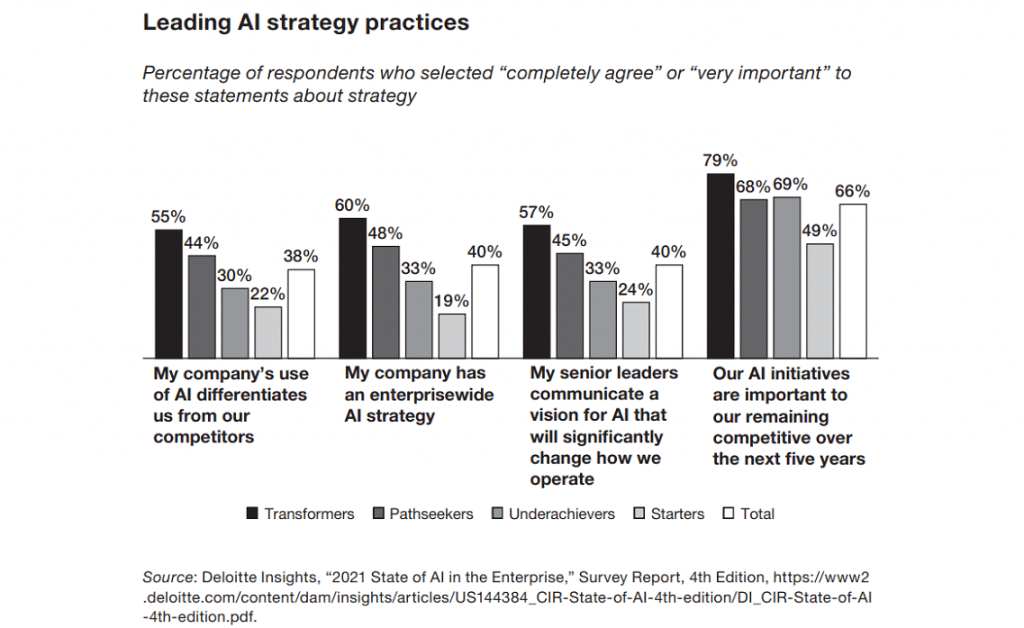
According to their studies, many companies believe that integrating artificial intelligence sets them apart from their competitors. Additionally, they have been implementing AI-related strategies throughout the entire organization, as they envision that AI will have significant positive impact overall.
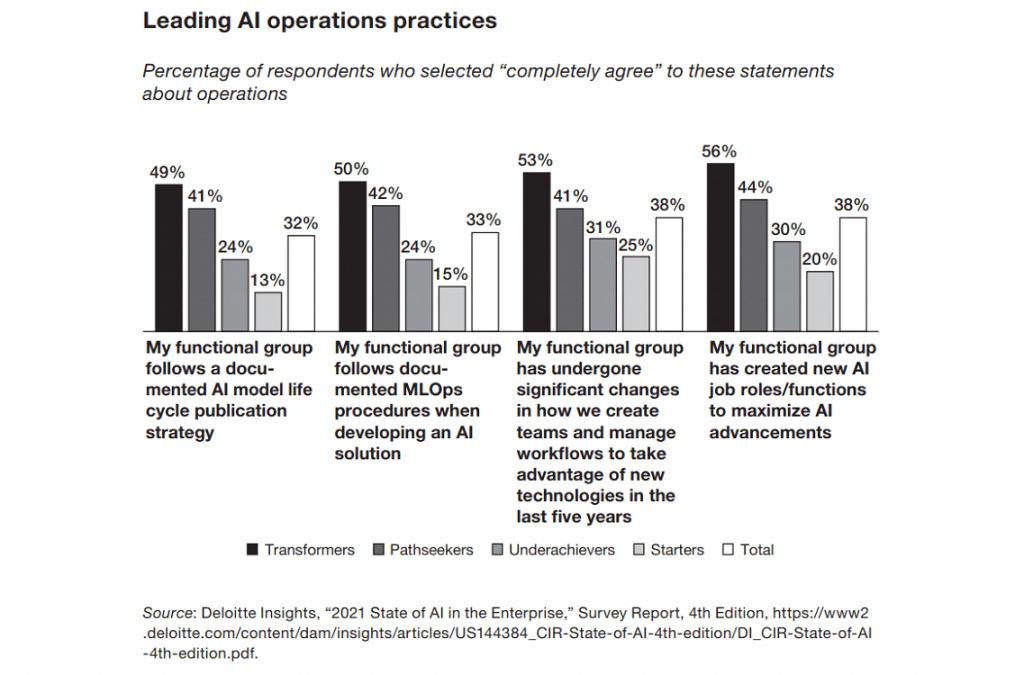
Moreover, high-achieving organizations were more likely to adopt various artificial intelligence operational practices compared to lower-achieving organizations. The utilization of machine learning operations ensured the effectiveness in production and workflow management.
In “Reshaping Business With Artificial Intelligence: Closing the Gap Between Ambition and Action” by Sam Ransbotham, David Kiron, Philipp Gerbert, and Martin Reeves, provides a baseline information on the strategies used by different companies on integrating of AI, and steps need to take to develop a strategy for their business. The survey was conducted in 2017, from 112 countries and 21 industries, from organizations of different sizes.
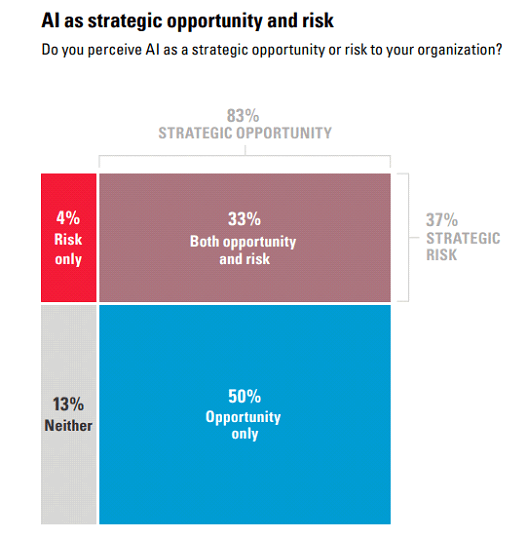
More than 80% of organizations see artificial intelligence as a strategic opportunity. In fact, 50%, the largest group of respondents, consider AI to be an only opportunity. This implies that businesses believe that AI will be significantly beneficial when it comes to achieving organizational goals.
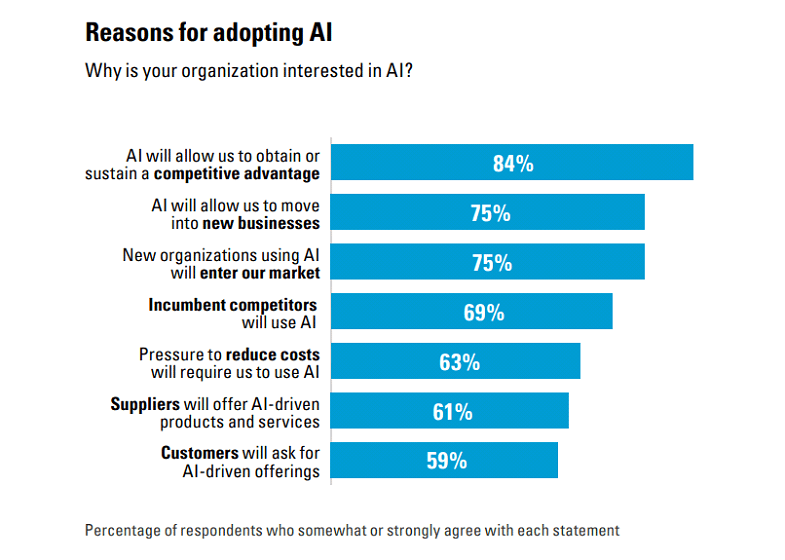
In addition, most of the respondents believe that AI will benefit the organizations, such as through new business or reduced costs. Organizations believe the integration of artificial intelligence in their business processes will give them competitive advantage. Also, they are considering utilizing AI for a multitude of benefits such as allowing them to move into new businesses, keeping up with competing organizations and suppliers, reducing costs, and meeting the customer needs.
Conclusion
The integration of artificial intelligence in businesses has a transformative impact in different workflows of organizations. From revolutionizing customer service, automation processes, improving business analytics, human resources, transforming marketing and modification of supply chain management. With the power of AI tools like Chatbots and virtual assistants, businesses can provide 24/7 assistance to the customers and tailored recommendations. Through the use of AI, it helps to automate repetitive tasks, increasing productivity and reducing human error.
In addition, artificial intelligence is seen as a tool for enhancing the operational efficiency, driving sales growth, and innovating in new markets. The integration of AI throughout the organizations is believed to set the companies apart from their competitors. As businesses continue to utilize the power of artificial intelligence, they have the advantage to lead and gain a competitive edge in the digital age of the business industry.





